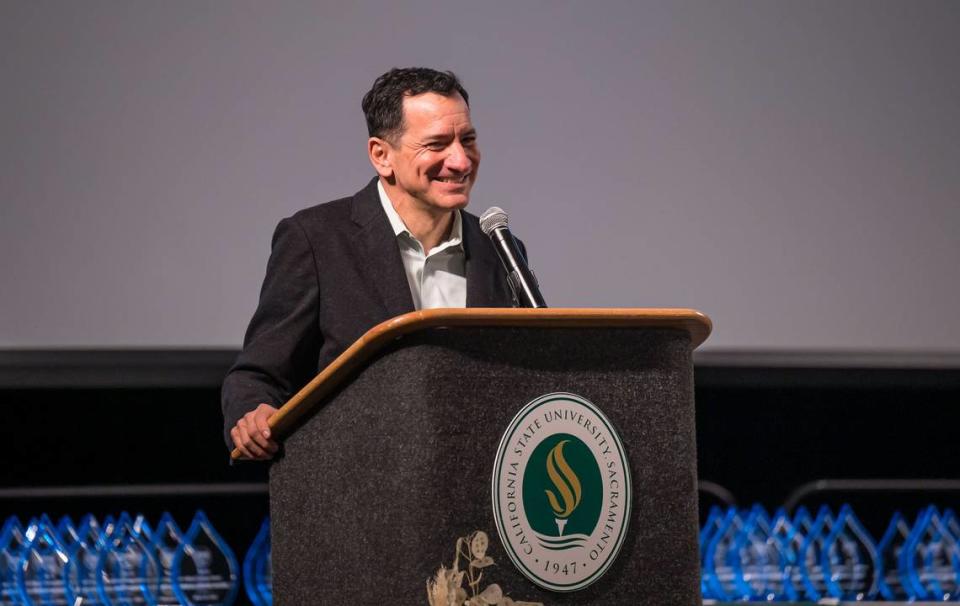Is it government’s job to make you happy? Some California lawmakers are going to try | Opinion
The state of California has a question: What makes you happy? Is it family ... good health ... financial security ... a sense of purpose? All of the above?
Or is it more elusive than that?
Whatever it may be, the state Legislature is on a mission to make you happy, or at least happier.
Former Assembly Speaker Anthony Rendon, a Democrat from Southeast Los Angeles, has created the Select Committee on Happiness and Public Policy Outcomes.
He’s been thinking about the subject for 10 or 11 years, ever since he watched the 2012 film “Happy” around 14 times over two or three days.
(If you haven’t seen “Happy” — or can barely remember — it “takes us on a journey from the swamps of Louisiana to the slums of Kolkata in search of what really makes people happy,” according to its marketing blurb.)
Several other nations already have happiness committees, but California’s is the first of its kind in the U.S., Rendon said at the committee’s inaugural hearing on March 12.
“I think it’s silly to be concerned about anything other than making this world a better place. And I think .... not studying happiness is silly,” he said.

No ‘new age sloppiness’
Even so, it’s tempting to mock all this happiness stuff.
For instance, I would happily tell the committee exactly what would lighten my mood: Forgive that $2,098 state income tax bill due on April 15. I could use that money to make my entire family happy — at least temporarily — by treating them to a vacation, or at least taking them out for a nice dinner.
Except, I don’t have the heart for snark.
For one, all the participants in this project are so very sincere and obviously only want to — at the risk of stating the obvious — make us happy.
For another, this is going to be based on real data — not on what Rendon has referred to as “new-age sloppiness.”
Finally, Rendon does make sense when he points out that, until now, the state of California seemingly could not give a fig (or an avocado) about whether or not we’re happy.
“From my perspective, we had something like 5,000 bills last year. Only seven of them utilized the word ‘happiness,’” he said.
“Is that correct?” he added, turning to others seated at the table. “I make up stats sometimes.”
But is it really government’s role to make us happy?
Or is up to government to try to provide the quality-of-life stuff that is a good foundation for happiness: public safety, decent housing, jobs and fair wages, clean air and water, quality education, access to health care and counseling, affordable child care, etc.?
It absolutely is.
While it is true that some remarkable people can thrive no matter their circumstances — poverty, chronic illness, even war — most of us need at least some base-line level of security and stability to be reasonably satisfied. Government plays a big role in providing that.
As for being truly happy, it’s beyond the purview of government to provide the one essential ingredient: To paraphrase an old Rolling Stones song, we need a love to keep us happy.
It doesn’t have to be romantic love. It doesn’t necessarily have to be the love of a human being. In the words of the late, great Charles Schulz, happiness truly can be found in a warm puppy.
What matters is connection — having a living being we care for who, in turn, cares about us.
Unfortunately, in this current epidemic of loneliness, that’s not as simple as it sounds.

Forging connections
But there are ways to help. Government may not be able legislate connections, but it can facilitate them.
It can provide places where we can gather: parks and playgrounds, gyms, community centers, hiking trails, public gardens, swimming pools, pickleball courts.
It can fund programs that foster connections: free concerts and dances, recreation programs, continuing education for adults, classes for new moms and dads, in-home visits for homebound Californians.
It can adopt design standards that encourage interactions. In cities, that can mean creating public spaces with shade, comfortable seating, maybe even games. In residential neighborhoods, walking and biking trails, pocket parks and meeting rooms. Some cities are encouraging or even requiring front porches, so that folks might spend more time sitting outside and visiting instead of holing up in font of the TV.
And it can ensure that our schools teach compassion, respect and the value of community while discouraging the bullying and ostracism that can so often lead to a lifetime of unhappiness.
Most of these initiatives are outside the jurisdiction of state government, though there are ways to nudge local agencies to adopt policies and programs. Grants, for instance.
And by elevating the importance of happiness — giving it select committee status, no less! — the state Legislature is reminding us that, despite all the bad in the world, we still deserve some light in our lives.
Nothing silly about that.

